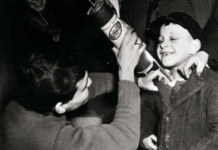Psychiatry’s Current Greatest Controversy: Fraud, Bullsh*t or What?
In the current issue of the journal Ethical Human Psychology and Psychiatry, Australian dissident psychiatrist Niall McLaren titles his article, “Psychiatry as Bullshit” and makes a case for just that. The great controversies in psychiatry are no longer about its chemical-imbalance theory of mental illness or its DSM diagnostic system, both of which have now been declared invalid even by the pillars of the psychiatry establishment. The great controversy today has now become just how psychiatry can be most fairly characterized given its record of being proven wrong about virtually all of its assertions, most notably about its classifications of behaviors, theories of “mental illness,” and treatment effectiveness/adverse effects.
“Shouting, Voting and Not Much Science: How Sexuality Becomes ‘Mental Illness’”
Tracy Clark-Flory describes “how subject to changing scientific understandings and, sometimes, even political influence the DSM can be-perhaps especially when it comes to sexuality.”
Article...
“New Federal Rules Target Woeful Public Reporting of Clinical Trial Results”
For STAT, Charles Piller covers new federal rules requiring stricter reporting for researchers conducting human studies. Previous investigations have documented widespread noncompliance with such...
“Did the FDA set ‘a Dangerous Precedent’ with Latest Drug Approval?”
STAT reports that the latest drug approval by the FDA “may have set a precedent that could rocket through the health care system, opening the...
STOP or GO? Tapering Pregnant Women off of Antidepressants
A team in the Netherlands is currently investigating the effects of tapering off of antidepressants known as selective serotonin reuptake inhibitors (SSRIs) during pregnancy....
Depression, Antidepressants, and Expectancy
This study reinforces a large body of evidence suggesting that an individual’s expectancies for improvement significantly contribute to their actual improvement. The importance of expectancies is worth paying attention to now as more clients, clinicians, and researchers are endorsing a reductionist view of psychological disorders -- i.e., that psychological disorders are fundamentally brain disorders.
The ADHD Drug Epidemic: Addiction, Abuse, and Death
A new analysis of FDA data, published on September 10th by the Milwaukee Journal Sentinel/MedPage Today, reveals the dangers of the common prescription of...
Enough is Enough Series, #5 – The ADHD Fiction is Exposed. The French Have...
The time has come that the fictitious ADHD qualifies for my ‘Enough is Enough’ series. It’s time to stop addressing pharmaceutical psychiatry on its own terms: its fraudulent and corrupt 'science,' its spurious 'evidence base,' and its imaginary psychiatric ‘diseases.’ I’m done with this. The evidence is in. Let’s get real. Psychiatry has become a profession of drug pushers. As a psychiatrist I am beyond troubled. Let’s get real.
The Algorithm Will See You Now: A Geek Tragedy
We would, in fact, save vast amounts of money by giving the pharmaceutical companies ten times the inflated prices they currently receive for drugs as part of a bargain that ensures only 10% of those currently taking lipid-lowering drugs, antidepressants, biphosphonate and other drugs end up on them. The savings would come from not having to treat treatment-induced disabilities.
Helpful and Hopeful Thoughts
The basic idea behind successful psychotherapy is that our thoughts create our feelings. And, luckily, our thoughts are changeable. I have personally experienced how liberating only one thought can be to a complex problem. That's why I would precent some of the thoughts that I have found most useful personally, and in therapy with patients, over 25 years.
Confessions of a Trespasser
In a recently published commentary in Psychiatric Times, Ronald Pies and Joseph Pierre made this assertion: Only clinicians, with an expertise in assessing the research literature, should be weighing in on the topic of the efficacy of psychiatric drugs. They wrote their commentary shortly after I had published on madinamerica “The Case Against Antipsychotics,” and it was clear they had me in their crosshairs.
How Psychiatry Almost Stopped Burning Man: A Story of Hell and Liberation
As Burning Man nears its 30th anniversary, USA Today has published an article attempting to explain how this still somewhat freakish event came into existence. I enjoyed the article, but as someone involved in the origin story it tells, I believe that an important piece is being left out. This relates to how misguided “mental health treatment” came close to disabling a key organizer of the early Burning Man. This piece is a fascinating tale in itself, but more fascinating when considered as just one example of how a flawed approach to mental health treatment forms a barrier to many forms of cultural evolution and renewal, with oppressive consequences for society as a whole.
Dear Boston Globe, Part IV: A Taste of Your Own Medicine
The Boston Globe paints a picture (in the vivid way that they so love to do) that pins the system’s decline primarily on budgetary issues, but there is more than one way for a system to be ‘broken.’ In fact, where the Globe goes most wrong in their latest piece, ‘Community Care,’ is in their failure to adequately recognize that the system has always been broken in one way or another in this country.
Who and What Killed Prince and Michael Jackson? Will the Role of Benzos Ever...
It is the deadly cocktail of benzodiazepines and opiates that is most responsible for the rising rate of opiate overdose deaths... and benzos may actually be THE decisive deadly component in the lethal drug combination. Yes, fentanyl and propofol can be dangerous drugs, but to focus the main attention in this crisis on these rarely used drugs is deliberately misleading...This minimizes the critical role of benzos and rather conveniently lets certain institutions and their leaders off the hook as the main suspects in such a vast number of cases that should be labeled as crimes of negligent homicide.
Aimee Inomata – Long Bio
Aimee Inomata, PhD, is a writer, researcher and reformed academic who uses her training in philosophy and literature to critically analyze the underlying rhetoric...
Why Mental Health Organizations Should Endorse the Movement for Black Lives
The psychiatric survivor movement, which then became the consumer movement and recovery movement and now the peer movement, was born in a time of civil rights and Black organizing in the US. It was Black people in the civil rights movement who inspired all of us to make social change real, and psychiatric patients and progressive professionals took up that inspiration. In a very real way, Black protest made psychiatric protest possible, which then led to the modern consumer/peer/recovery movement.
Dear Boston Globe, Part III: We Came. We Protested. You Still Didn’t Listen.
On Monday, August 1, over 140 people arrived on the Globe's door step asking for change. They came as a part of a Vigil entitled, ‘The People’s Spotlight.’ The event was in direct response to your ‘Spotlight on Mental Health’ series (still, painfully) called ‘The Desperate and the Dead’ (in case you didn’t catch the play on titles yourself). The demands were relatively simple.
“Beyond Anger”
Writing for Aeon, the famous philosopher of ethics, Martha Nussbaum addresses how philosophy can lead us out of a politics and culture of anger....
Six Lessons on Open Dialogue From the Collaborative Pathway Experiment
The Collaborative Pathway is a replication and adaptation of Open Dialogue at Advocates, Inc., a human services agency in Framingham, Massachusetts where I serve as Medical Director. Last week, our team published an article in the Best Practices column of the journal Psychiatric Services, describing the program and our results from the first cohort of young people and families experiencing a psychotic crisis. This is the first published adaptation of Open Dialogue in the U.S. and represents the culmination of several years of planning, training, and direct service.
Drug Choice, Scientology, Ego Needs & Other Divides: Real Politics 101, Part Three
Abolishing First-Order Psychiatry—which includes the American Psychiatric Association and its Big Pharma partners—as a legitimate authority in determining “mental illness” as well as abolishing First-Order Psychiatry’s “treatment” and control dominion are primarily political struggles. In Part One, I discussed the Rehumanizing Resistance’s political naivety; and in Part Two, I offered strategies and tactics. In Part Three, I will focus on how the Resistance can overcome frustration and disunity and gain greater strength.
The Case Against Antipsychotics
This review of the scientific literature, stretching across six decades, makes the case that antipsychotics, over the long-term, do more harm than good. The drugs lower recovery rates and worsen functional outcomes over longer periods of time.
“‘Acting Out’ or Suffering from Trauma?”
Eve Troeh and Mallory Falk explore the use of trauma informed curriculum in the New Orleans school system following Hurricane Katrina. “Consider the everyday...
Neuroplasticity and How the Brain Heals
For The Lancet, Jules Morgan reviews a new book, “The Brain’s Way of Healing,” by psychiatrist and psychoanalyst Norman Doidge. Doidge challenges current understandings...
“Learning to Live with the Voices Inside Your Head”
For ABC’s All in the Mind, Lynne Malcolm and Olivia Willis report on the latest research showing that hearing voices may be far more...
‘We’re Not Buying It!” — Survey on Emotional Distress and Diagnosis Reveals Mistrust of...
Very few public opinion polls on mental health issues have been conducted, and those that do exist are "forced choice" and presuppose an illness model. We at the East Side Institute wanted people to get the opportunity to reflect on and socialize their thoughts about the medical-mental illness-diagnostic model and its impact on their lives. And that is what they did!

















